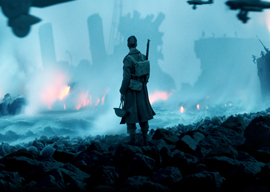
July 26, 2017

For instance, Dunkirk has no American actors because Nolan resents how Hollywood traditionally shoehorns American stars into English WWII stories, such as Steve McQueen, James Garner, Charles Bronson, and James Coburn in The Great Escape. (The one Englishman who is taken prisoner in Dunkirk had me feeling sorry for the commandant of his future Stalag.)
But English and American nationalism is out of fashion, so The New York Times winds up its rave review by asserting:
By the time that plane is burning”and a young man is looking searchingly into the future”you are reminded that the fight against fascism continues.
In reality, Dunkirk is probably the least anti-Fascist British WWII movie ever. Nolan never mentions “the Germans,” much less “the Nazis.” They are just “the enemy.” Branagh, star of a film about a shameless war of English aggression in Europe, Henry V, is there to remind you that, no matter what the current ideological justifications, going over to the Low Countries to kick the Continentals around is just something the English periodically do. It’s better than the Continentals coming over to England to fight their battles, which the English have avoided since 1066.
Mark Rylance, in contrast, represents a more Tolkienesque Little England that doesn”t see much attraction in fighting abroad”since the rest of the world is filled with foreigners”but will do what has to be done to secure the Shire.
What Dunkirk is really about is the English custom of forming orderly lines to await one’s turn. In his 1944 essay “The English People,” George Orwell wrote:
Our imaginary foreign observer would certainly be struck by our gentleness: by the orderly behaviour of English crowds, the lack of pushing and quarrelling, the willingness to form queues….
In contrast, in Steven Spielberg’s remarkable 1987 adaption of J.G. Ballard’s semiautobiographical WWII novel Empire of the Sun, adolescent Christian Bale (Nolan’s future Bruce Wayne) is swept away from his parents by the panicked and pushy Shanghai crowds” refusal to queue like proper Englishmen.
In contrast, Dunkirk portrays the opposite nightmare: Englishmen forming, as Englishmen do, immense queues on the one pier at Dunkirk, “The Mole,” to patiently await rescue while the enemy tries to mow them down. Nolan notes:
The problem with war films in general is that most of us are lucky enough to not have to experience those events. So sometimes it’s hard to relate. But we”ve all found ourselves in the pedestrian and everyday version of getting in some ridiculous line. And you don”t know who to ask and you don”t know what the hell is going on…. They knew when they joined that line, they would wait there and be attacked.
I suspect the almost surrealistic final sequence involving Hardy and his out-of-fuel Spitfire is intended to echo and top Spielberg’s jaw-dropping “Cadillac of the Skies” scene in Empire of the Sun in which Bale’s interned English boy switches loyalties from the Japanese Zero to the American Mustang. As Rylance explains in his understated style, the finest war machine ever is the British Spitfire.